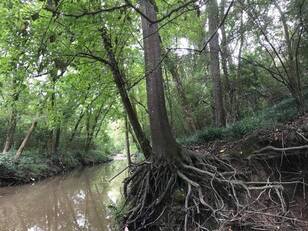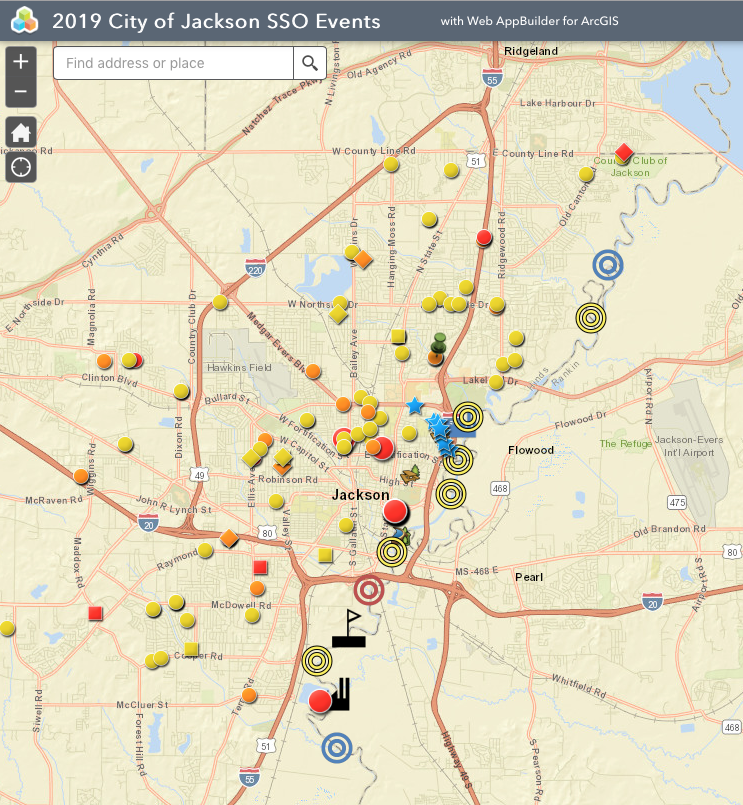 Lynch Creek, "Impaired"-Aquatic Life Support: Biological Impairment Lynch Creek, "Impaired"-Aquatic Life Support: Biological Impairment 9.6 million gallons of raw sewage and billions of gallons of minimally treated sewage released to the Pearl River and its tributaries in the second quarter of 2019. From Apr-June 2019, 43 separate Sanitary Sewer Overflow (SSO) discharges to "Waters of the State" occurred from the collection system sewer lines associated with the Savanna Street Wastewater Treatment Plant (WWTP). During this quarter, 165,760 gallons of raw sewage were released to Town Creek, 76,480 to Lynch Creek, 32,100 to Hanging Moss Creek, 10,150 to Purple Creek and 9.3 million gallons of raw sewage directly to the Pearl River. Total untreated sewage released by City of Jackson to the Pearl River watershed in the first two quarters of 2019 adds up to over 33.2 million gallons, enough to fill 50 Olympic size swimming pools. To put this amount in perspective, in 2016, Alabama Waterkeepers calculated the total sewage spilled for the entire year of 2016 throughout the entirety of Alabama waterways at 28.8 million gallons. The City of Jackson sanitary sewer system is exceeding this amount in 6 months into one watershed, our Pearl River. The US EPA suggests a benchmark of less than 4 SSOs per 100 miles of sewer per year. Last year, the City of Jackson had 18 SSO events per 100 miles of sewer. What is a a Sanitary Sewer Overflow? A Sanitary Sewer Overflow (SSO) is an event in which untreated sewage is discharged from the sewage collection system into the environment prior to reaching the sewage treatment facilities. These discharges endanger human health, cause property damage, and degrade our local water quality.
What causes SSO events? The SSO events experienced by the City of Jackson collection system were caused by excessive flow, collapsed pipes, grease/fat buildup, and blockages from roots and solids. EPA Consent Decree In November 2012, the Jackson City Council entered into a consent decree with the EPA and MDEQ regarding operations at the Savanna Street Wastewater Treatment Plant. The consent decree required the City to pay a civil penalty of $437,916, execute a $875,000 environmental project, and overhaul its wastewater treatment plant and collection systems. The City was given 18 years to fully comply, with the vast majority of the work to be completed within the next 11 years (by 2023). The City of Jackson was required to develop prioritization work plans, rehabilitation plans, preventative maintenance programs and supplemental environmental program timelines. The City is required to submit quarterly, semi-annual and annual reports to the EPA and must publish these on their website. Savanna Street Wastewater Treatment Plant According to the 2019 quarterly reports, a Savanna Street Wastewater Treatment Plant "Prohibited Bypass" that began on Dec 9, 2018 and lasted several months released 4.06 billion gallons of minimally treated sewage to the Pearl River. A "Prohibited Bypass" occurs when the plant is overwhelmed with excessive flow, usually due to high rain events, and bypasses must occur. "All bypassed volume is chlorinated, de-chlorinated and required samples taken prior to blending with the mechanical plant effluent and subsequently discharged to the Pearl River". Is public notification required during an SSO event?
Where have the City of Jackson 2019 SSO events occurred?
Check out our interactive map below to find out if a SSO event occurred in your City of Jackson neighborhood. Click on the pinned locations for information about the date, location, cause of the overflow, and amount of untreated sewage released. Large Scale Map Link |
AuthorPearl Riverkeeper is a licensed member of the Waterkeeper Alliance, the largest and fastest growing nonprofit solely focused on clean water. Archives
July 2024
Categories |
|
Ready to support our work for Clean Water and Healthy Rivers?
|
|


 RSS Feed
RSS Feed
